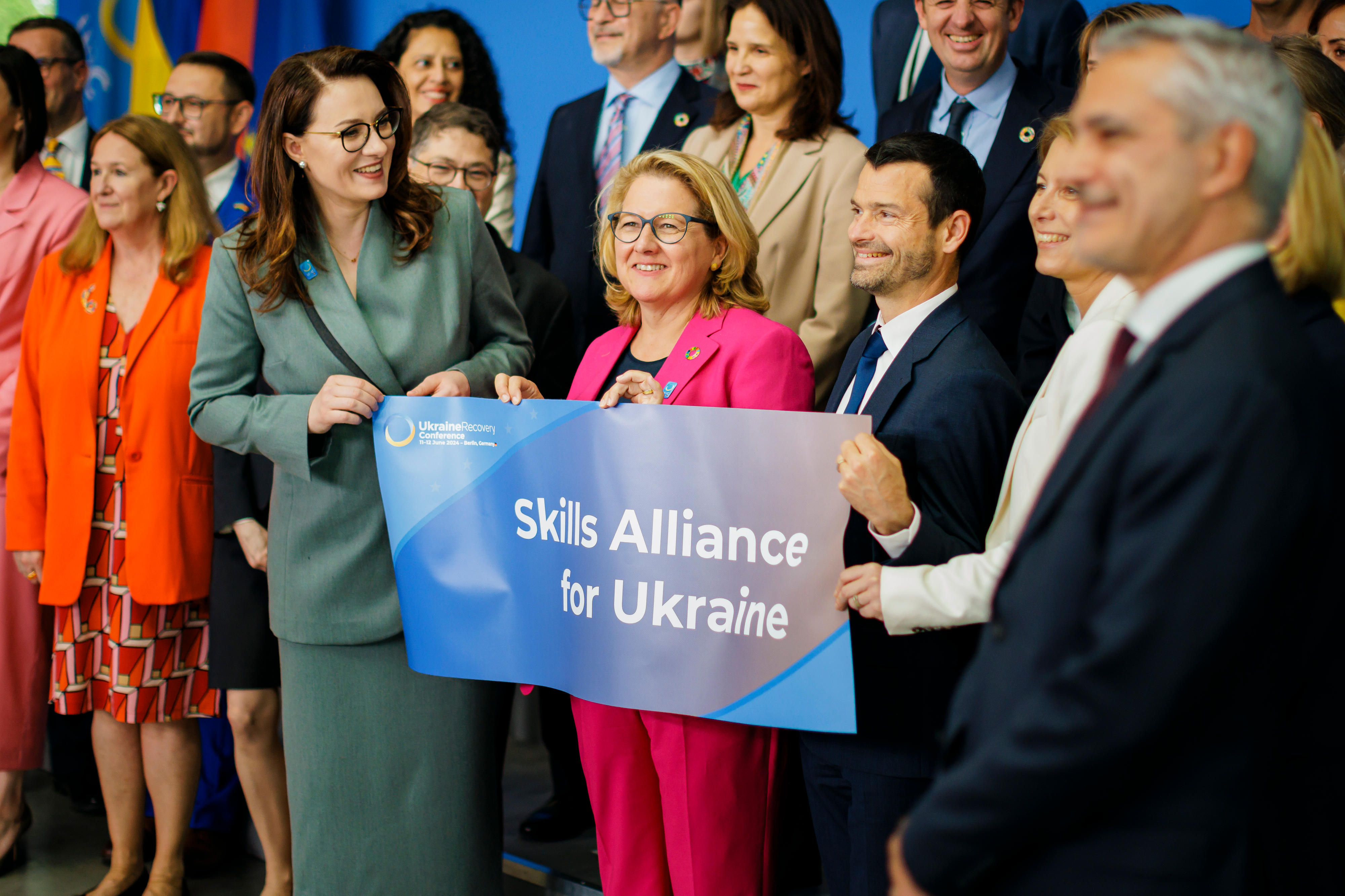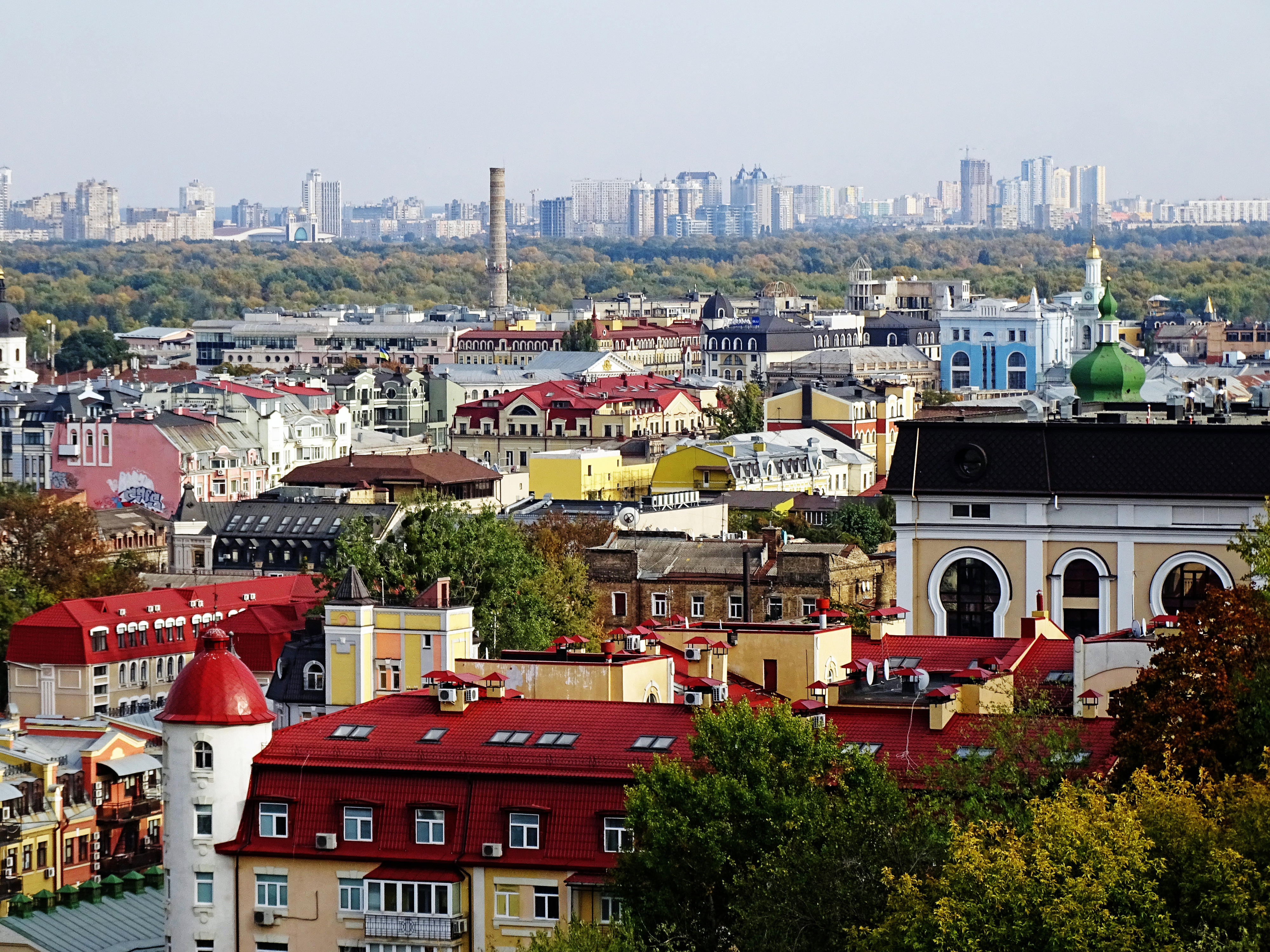Ukraine Recovery Conference More than 180,000 newly trained skilled workers for Ukraine’s reconstruction: Launch of the international “Skills Alliance for Ukraine” at URC2024
Young people in particular are facing uncertainties about their future as a result of the war. Interrupted learning or training opportunities could have lifelong consequences for a whole generation. These factors have a profound impact on the available skilled workforce, especially in key sectors that are urgently needed for recovery and reconstruction such as construction, transport, IT, engineering and health care.
To address these challenges and to ensure that Ukraine has the skilled workers it needs, more than 50 countries, international organisations and members of the business community made a commitment today at the Ukraine Recovery Conference to join forces to train and support over 180,000 Ukrainians over the next three years in order to rebuild their country. The Alliance members will provide a total of over 700 million euros to achieve the Alliance’s goals.
The Alliance is primarily aimed at young people, internally displaced persons and women. If these population groups are given targeted training now, they can become the pillars of Ukraine’s reconstruction. Women in particular are learning new professions and taking on additional tasks while many of the men are at the front. The Alliance is chiefly directed towards people in Ukraine, but also supports Ukrainians abroad. Providing Ukrainians who fled their country with training in areas that are important for Ukraine’s reconstruction and ensuring mutual recognition of qualifications will help Ukrainians who return to their home country to find work more easily.
The Skills Alliance brings together different initiatives and strengthens effective collaboration between Ukraine and the Alliance members. One example is the Skills4Recovery initiative, which is co-financed by the European Union, Germany, Estonia and Poland. Skills4Recovery enhances workforce training for internally displaced people, youth, veterans and vulnerable groups, with a specific focus on vital industries such as construction, logistics, agriculture, services and manufacturing.
International and Ukrainian businesses are essential partners in the Skills Alliance, as they employ the workforce that will drive Ukraine’s economic recovery. Many of these companies are already training Ukrainians, such as Google and Scania.
Development Minister Svenja Schulze said, “Every day Russia destroys buildings, hospitals and power lines in its brutal war of aggression against Ukraine. It is targeting the daily life of all Ukrainians. In order to live, Ukraine needs to rebuild what has been destroyed. And for this, Ukraine needs skilled workers: electricians, engineers and architects, as well as doctors and psychologists. That is why we are launching the Skills Alliance for Ukraine today. In this way, we are giving Ukraine critical support in times of war, as well as supporting its recovery. No matter how often Russia destroys power lines, hospitals or buildings, Ukrainians will have the knowledge and skills to rebuild them.”
Ukrainian First Deputy Prime Minister and Minister of Economy Yuliia Svyrydenko said, “Despite Russia continuing the war, we are already rebuilding Ukraine. One of the main challenges on this path is structural unemployment, meaning shortage of workers in certain professions, even though there are plenty of job seekers in the market. This is especially noticeable in professions previously dominated by men: construction, transport and logistics, mining, and energy. Overall, we understand that recovery will require many specialists in various fields. To equip Ukrainians with the skills necessary for rebuilding, we have launched the Skills Alliance. This initiative aims to create conditions for Ukrainians to acquire new qualifications. Alliance will help to meet the labor needs in Ukraine and speed up the country's recovery, improve employment prospects for Ukrainian youth, internally displaced persons, veterans, and create conditions for the return of Ukrainians from abroad. So we invite other partners to join Alliance as well.”
Olivér Várhelyi, European Commissioner for Neighbourhood and Enlargement noted: “The European Union stands by Ukraine in these challenging times, to resist the Russian aggression and to recover, reconstruct and modernise the country. We are pleased to cooperate with key international partners in this effort, deploying or funding instruments to mobilise public and private investments at scale and amplify the impact of our assistance. Looking ahead, we hope that the initiatives launched today will contribute to building back better and integrating Ukraine into the European Union.”
Partners of the Skills Alliance for Ukraine
Countries/bodies:
1. Belgium
2. Estonia
3. EU
4. France
5. Germany
6. Italy
7. Japan
8. Latvia
9. Lithuania
10. Netherlands
11. Norway
12. Poland
13. Republic of Korea
14. Sweden
15. Switzerland
16. United Kingdom
17. United States Agency for International Development (USAID)
18. Ukraine
International financing institutions and international organisations:
19. Council of Europe Development Bank (CEB)
20. European Bank for Reconstruction and Development (EBRD)
21. European Investment Bank (EIB)
22. The World Bank Group
23. International Labour Organization (ILO)
24. International Organization for Migration Ukraine (IOM Ukraine)
25. Organisation for Economic Co-operation and Development (OECD)
26. United Nations International Children’s Emergency Fund (UNICEF)
27. United Nations High Commissioner for Refugees (UNHCR)
Private sector/companies:
28. Abt Global
29. Bayer
30. Google
31. PricewaterhouseCoopers (PWC)
32. Scania
Non-state actors and implementing partners:
33. Adventist Development and Relief Agency (ADRA)
34. Allianz Ukrainischer Organisationen
35. Beredskapslyftet Skill Shift Initiative
36. Care International
37. Centre for Economic Strategy
38. CRISP
39. Cormack Consulting Group
40. Deutscher Volkshochschulverband
41. Education Exchange Support Foundation Lithuania
42. European Academy of Diplomacy
43. FHI 360
44. Initiative Wohnungswirtschaft Osteuropa
45. Finnish National Agency for Education (EDUFI)
46. GIZ
47. Hoffnungszeichen Sign of Hope e.V.
48. Help e.V. – Hilfe zur Selbsthilfe
49. Initiative Wohnungswirtschaft Osteuropa
50. KfW
51. Open Platform e.V.
52. Norad
53. Promprylad Foundation
54. Solidarity Fund Poland
55. SOS Kinderdörfer weltweit
56. Leaders of Change Foundation
57. Tent Partnership for Refugees

